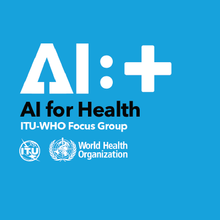
Summary
The ITU-WHO Focus Group on Artificial Intelligence for Health (AI for Health) is an inter-agency collaboration between the World Health Organization and the ITU, which created a benchmarking framework to assess the accuracy of AI in health.[1][2]
 ITU-WHO Focus Group on Artificial Intelligence for Health | |
| Abbreviation | AI for Health |
|---|---|
| Formation | 2018 |
| Type | Standards organization |
| Purpose | Benchmarking framework for AI in health diagnostic aids |
| Location | |
Region served | Worldwide |
Chairman | Thomas Wiegand |
Vice-Chairman | Stephen Ibaraki |
Secretariat | Simao Campos, Bastiaan Quast |
Parent organization | ITU-T Study Group 16 |
| Subsidiaries | Working Groups and Topic Groups |
| Affiliations | ITU-T, World Health Organization |
| Website | www |
This organization convenes an international network of experts and stakeholders from fields like research, practice, regulation, ethics, public health, etc, that develops guideline documentation and code. The documents address ethics, assessment/evaluation, handling, and regulation of AI for health solutions, covering specific use cases including AI in ophthalmology, histopathology, dentistry, malaria detection, radiology, symptom checker applications, etc. FG-AI4H has established an ad hoc group concerned with digital technologies for health emergencies, including COVID-19. All documentation is public.[3]
The idea for the Focus Group came out of the Health Track of the 2018 AI for Good Global Summit.[3] Administratively, FG-AI4H was created by ITU-T Study Group 16. Under ITU-T's framework, participation in Focus Groups is open to anyone from an ITU Member State. The secretariat is provided by the Telecommunication Standardization Bureau (under Director Chaesub Lee). It was first created at the July 2018 meeting with a lifetime of two years,[4] at the July 2020 meeting, this was extended for another two years, where the focus group also submitted its deliverables to its parent body.[5] It was also presented at the NeurIPS 2020 health workshop.[6]
The outline of the benchmarking framework was published in a commentary in The Lancet.[1]
AI for Health Framework edit
The Deliverables (outputs) of the Focus Group AI for Health are structured in the AI for Health Framework, which roughly corresponds to the dashed-line area in the above ecosystem diagram. Depending on their primary domain being health or ICT, the individual components of the AI for Health Framework were ratified by the corresponding United Nations Specialized Agency, as WHO Guidelines and ITU Recommendations respectively.
Standards drawn up by FG-AI4H are titled as:
- AI4H ethics considerations
- AI4H regulatory [best practices | considerations]
- AI4H requirements specification
- AI software life cycle specification
- Data specification
- AI training best practices specification
- AI4H evaluation considerations
- AI4H scale-up and adoption
- AI4H applications and platforms
- Use cases of the ITU-WHO Focus Group on AI for Health
See also edit
References edit
- ^ a b Wiegand, Thomas; Krishnamurthy, Ramesh; Kuglitsch, Monique; Lee, Naomi; Pujari, Sameer; Salathé, Marcel; Wenzel, Markus; Xu, Shan (2019-07-06). "WHO and ITU establish benchmarking process for artificial intelligence in health". The Lancet. 394 (10192): 9–11. doi:10.1016/S0140-6736(19)30762-7. ISSN 0140-6736. PMID 30935732. S2CID 85567072.
- ^ Wiegand, Thomas; Lee, Naomi; Pujari, Sameer; Singh, Manjula; Xu, Shan; Lecoultre, Marc; Riviere-Cinnamond, Ana; Weicken, Eva; Wenzel, Markus; Campos, Simão; Quast, Bastiaan (2020). "Whitepaper for the ITU/WHO Focus Group on Artificial Intelligence for Health" (PDF). International Telecommunication Union.
- ^ a b "Focus Group on "Artificial Intelligence for Health"". www.itu.int. Archived from the original on 2020-07-26. Retrieved 2021-01-22.
- ^ "Meeting results (2018-07-09~20)". www.itu.int. Archived from the original on 2020-07-26. Retrieved 2020-07-26.
- ^ "SG16 results (Geneva, 26 June - 3 July 2020)". www.itu.int. Archived from the original on 2020-07-26. Retrieved 2020-07-26.
- ^ Oala, Luis; Fehr, Jana (2020). "ML4H Auditing: From Paper to Practice" (PDF). Proceedings of Machine Learning Research. 136: 281–317.


